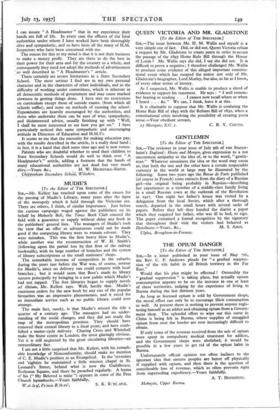MUDIE'S
[To the Editor of THE SPECTATOR.] SIR,—Mr. Kellett has touched upon some of the causes for the passing of Mudie's Library, many years after the lapse of the monopoly which it held through the Victorian era. There are others, I think, of similar importance. Just before the curious campaign waged against the publishers on its behalf by Moberly Bell, the Times Book Club entered the field with a guarantee to supply without delay any book in the publishers' general lists. The managers of Mudie's took the view that an offer so adventurous could not be made good if the competing library were to remain solvent. They were mistaken. This was the first heavy blow to Mudie's, while another was the reconstruction of W. H. Smith's (following upon the partial loss by that firm of the railway bookstalls), with its large number of branches and the system of library subscriptions at the small stationers' shops.
The remarkable increase of competition in the suburbs during the years just before the War was, of course, serious for Mudie's, since no delivery van could compete with local branches ; but it would seem that Boot's made its library success principally by bringing in a new public which Mudie's had not, tapped. The free libraries began to supply novels ad libitum, Mr. Kellett says. Well, hardly that. Mudie's enormous orders for the new book by any one of the popular favourites was an impressive phenomenon, and it stood for an immediate service such as no public library could ever attempt.
The main fact, surely, is that Mudie's missed the tide a quarter of a century ago. The managers had no under- standing of the social changes, and they did not study the map of the metropolitan province. They should have removed their central library to a focal point, and have estab- lished a motor-cycle delivery. Charing Cross and Whitehall make the finest centre in London, the most glaringly obvious. Yet it is still neglected by the great circulating libraries—an extraordinary fact. I am not a little surprised that Mr. Kellett, with his remark- able knowledge of Nonconformity, should make no mention of C. E. Mudie's position as an Evangelical. In the 'seventies and 'eighties he maintained a little mission chapel in St. Leonard's Street, behind what is now the Guildhouse, Eccleston 'Square, and there he preached regularly. A hymn of his (" My Beloved is mine ") appears in some of the Free Church hymnbooks.—Yours faithfully,






























































 Previous page
Previous page